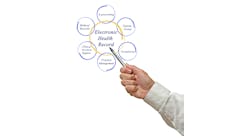Suchi Saria, Ph.D., an associate professor of machine learning and healthcare at Johns Hopkins University in Baltimore, has founded a company called Bayesian Health that has venture capital backing to offer an artificial intelligence-based clinical decision support platform. In a recent interview, she described how the platform can make the EHR more dynamic and predictive.
For physicians today, there is an explosion of data — from encounters, labs, treatment, notes, and even social data, Saria said. Integrating all that in your head in the moment you see the patient is very difficult. Bayesian’s modules are designed make it possible to do that in a systematic way, she explained. Bayesian’s AI platform sits within the EHR, analyzing patient data with machine learning models. The platform sends actionable clinical signals within existing workflows when a critical moment is detected, helping physicians and care team members more accurately diagnose, intervene, and deliver care.
Saria has spent nearly two decades as a machine learning/AI researcher and runs the machine learning healthcare lab at Hopkins. “My work has involved building algorithms for use on messy clinical datasets,” she said, “and Bayesian is operationalizing a lot of the state-of the-art work in the field today.”
With a research foundation of over 20 patents and peer-reviewed research papers, Bayesian’s platform is based on technology licensed from the Johns Hopkins University. The platform is configured to scale within health systems, and targets high-priority areas with specific modules on clinical deterioration, sepsis, pressure injury, and transitions of care, Saria said.
The system provides clinical signals to providers, physicians, advanced practitioners, nurses, and case managers in order to assist them in real-time decision-making.
Saria said one of the first studies they are releasing involves its sepsis module used on 500,000 patients screened over a period of three years across five hospitals, with upwards of 2,000 providers using it and showing a high accuracy rate. The study followed the use and practice impact over two years for Bayesian’s sepsis module and showed the platform drove 1.85-hour faster antibiotic treatment for sepsis where timely treatment directly impacts mortality rate, she said. The platform also demonstrated high, sustained adoption by physicians and nurses (89 percent adoption), driven by the sensitivity and precision of the insights and user experience of the software.
Saria said it is important that the alert is actionable — early and transparent, not a black box. “When clinicians can actually see what the indicators were, it makes it very easy for them to then know what the next step is.”
Bayesian Health has raised $15 million in venture funding led by Andreessen Horowitz. Health 2047 Capital Partners, Lifeforce Capital, and Catalio Investments also participated in the round of funding.
“Creating an AI solution that can achieve high sensitivity and precision isn’t easy,” said Doug Given, M.D., Ph.D., managing partner at Health2047 Capital Partners, in a statement. “Bayesian’s platform was developed using the highest quality data, and tested by top physicians and clinicians. This, combined with the team’s technical expertise and research-first mentality, has allowed them to create an AI platform that can be applied to many safety and quality endpoints to transform care delivery in the hospital setting for the better.”
The majority of the applications Bayesian is tackling involve acute care or scenarios like transitions of care or monitoring patients at home. “We are looking at deterioration and sudden complications,” Saria said. “Eventually, as we continue to grow, we will work on using the same kinds of ideas in managing populations around value-based contracts or cancer patients where there's very high risk for secondary complications.”
Besides its close relationship with Johns Hopkins, Bayesian has also worked with the University of Washington on a platform for forecasting acute respiratory failure with COVID patients.
Saria reflected on the goal of improving clinical decision support. “People have wanted clinical decision support tools to succeed so badly,” she said. “When people think about clinical decision support historically, it's been rules-based guidelines that are not sensitive, not specific, not precise, not easy to use, not actionable. And mostly people think of it as a huge amount of alert fatigue, and annoying. And typical adoption in the field is pretty low. We're still only at the beginning. We’re turning the corner on being able to use new techniques and approaches to enable rapid development of high-quality CDS tools in a variety of new application areas.”
I asked Saria what the role is for regulation and the U.S. Food & Drug Administration in monitoring algorithms used in healthcare.
“I think the jury's out on like exactly what the future looks like in terms of regulation, she said. “But what is really clear now is we do need more rigorous approaches to evaluation and monitoring, because a lot of tools are getting deployed. In a paper that's going to come out in the New England Journal of Medicine soon, one of my co-authors describes an experience they had at Michigan where they built and deployed a tool. After COVID happened, it started misbehaving and firing rapidly all over the place, which was leading to overtreatment and mistreatment. We need continuous monitoring and continuous evaluation.”


